Key takeaways:
- Revisiting classic literature reveals personal growth and changing perspectives, allowing readers to uncover deeper meanings with each encounter.
- Classics prompt reflection on universal themes and moral dilemmas, fostering empathy and critical analysis of societal norms and personal beliefs.
- Engaging with the historical context and diverse interpretations of classics enhances understanding and appreciation of their relevance to contemporary issues.

The value of revisiting classics
Revisiting classics can feel like reuniting with an old friend; there’s a familiarity that brings comfort, yet each encounter reveals something new. I remember picking up Pride and Prejudice for the third time and being struck by how the nuances of Elizabeth Bennet’s character felt different, reflecting my own growth over the years. Have you ever noticed how your perspective shifts as you evolve?
These timeless works often hold layers of meaning that can easily go unnoticed during an initial read. When I first approached Moby-Dick, I struggled to connect with its complex narrative. However, diving back in, I found myself captivated by Melville’s exploration of obsession and humanity, offering rich insights that resonated deeply with my own life experiences. Isn’t it fascinating how our interactions with literature can mirror our personal journeys?
Revisiting classics also allows us to appreciate the cultural and historical contexts in which they were written. I vividly recall reading The Great Gatsby in high school, merely skimming its surface. Yet, in my later years, I found myself enthralled not only by Fitzgerald’s prose but also by the reflection it cast on the era’s social dynamics and aspirations—a stark reminder of how history informs our present. How often do we overlook the depth of these works, only to discover gems that enrich our understanding?
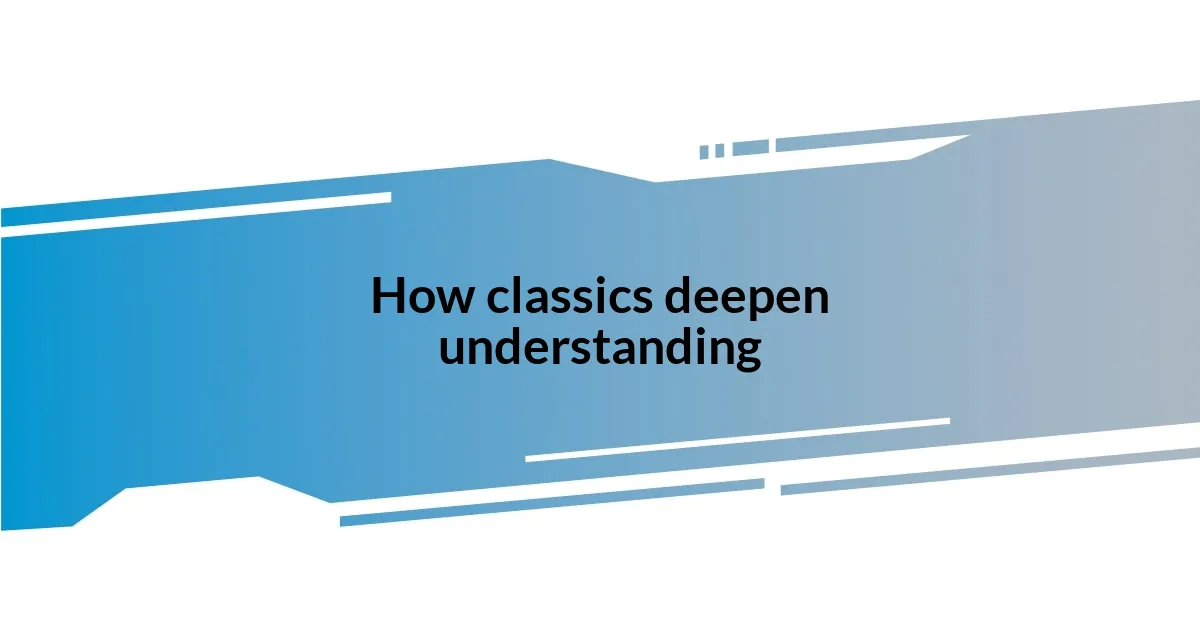
How classics deepen understanding
When I think about how classics deepen understanding, it’s akin to peeling back the layers of an onion. Each read reveals fresh insights that resonate differently based on where we are in life. I remember picking up 1984 after several years and finding myself shocked by its relevance to today’s world. The themes of surveillance and freedom felt almost prophetic, and it dawned on me how literature can often serve as a mirror to current events, allowing us to critically assess our circumstances.
The beauty lies in how classics prompt us to reflect on universal themes of humanity. Returning to To Kill a Mockingbird, I was struck by how Atticus Finch’s moral compass challenges us to confront our own beliefs and biases. It made me reflect on moments in my life where I had to stand up for what I believed was right, even when it was difficult. The emotional weight of these stories is profound; they hold up a lens through which we can examine our own actions and societal norms.
Moreover, engaging with these timeless texts deepens our empathy. After re-reading The Color Purple, I found myself deeply moved by Celie’s journey of struggle and resilience. Each page offered not just a glimpse into her life but also a challenge for me to understand experiences vastly different from my own. It’s through these narratives that we can foster empathy, enabling us to connect with others in a more meaningful way.
| Classic | Theme Explored |
|---|---|
| Pride and Prejudice | Personal growth and societal norms |
| Moby-Dick | Obsession and humanity |
| The Great Gatsby | Social dynamics and aspirations |
| 1984 | Surveillance and freedom |
| To Kill a Mockingbird | Moral integrity and prejudice |
| The Color Purple | Struggle and resilience |
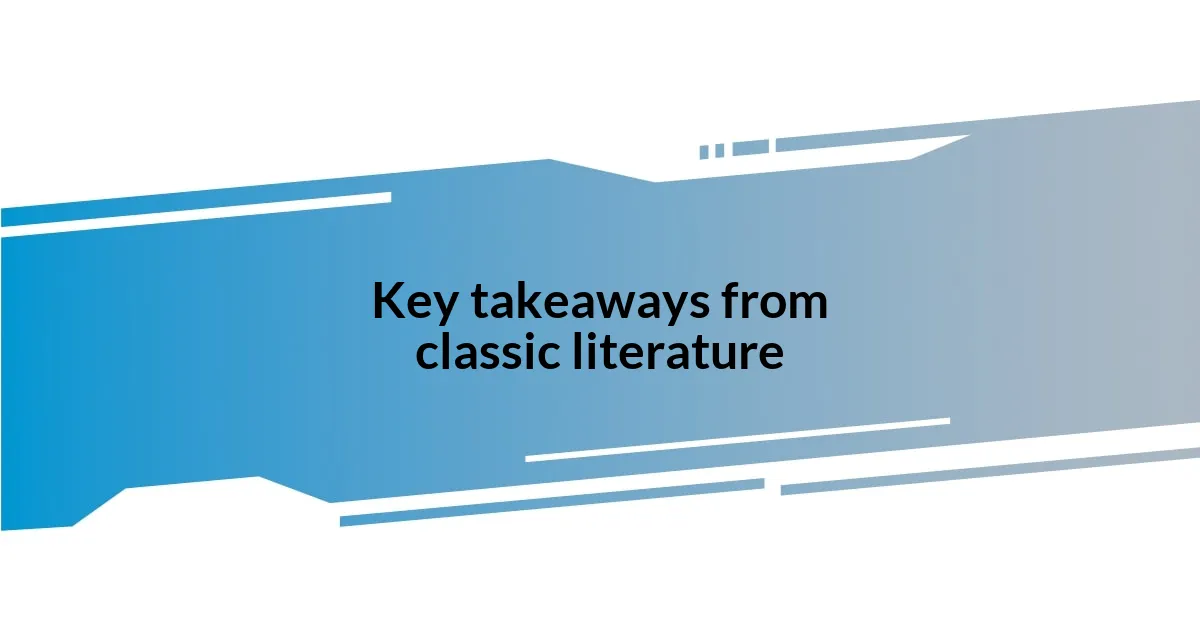
Key takeaways from classic literature
There’s something undeniably powerful about engaging with classic literature that often catches me off guard. Each time I dive back into these narratives, I rediscover fragments of myself, shaped by the journey I’ve taken since I last read them. For instance, I remember reading The Catcher in the Rye during my teenage years; I found Holden Caulfield’s angst relatable then. Reopening the book later in life, I felt a poignant sadness for his struggles, sparking reflections on my own flaws and insecurities. Isn’t it compelling how characters can echo our personal battles, prompting us to confront aspects of ourselves we might otherwise avoid?
Key takeaways that resonate deeply with me when revisiting these literature classics include:
- Personal Growth: Each reading reflects how much I’ve changed, shedding light on my evolving perspectives.
- Emotional Depth: Characters’ struggles often illuminate my own life moments, driving home the importance of empathy.
- Historical Context: Classics provide a vivid lens into past societies, enriching my understanding of cultural shifts that shape our world today.
- Universal Themes: The fundamental truths about humanity continue to resonate, reminding me we’re all connected in our experiences and feelings.
- Critical Reflection: Engaging with these stories urges me to critically analyze my values and beliefs in the context of contemporary issues.
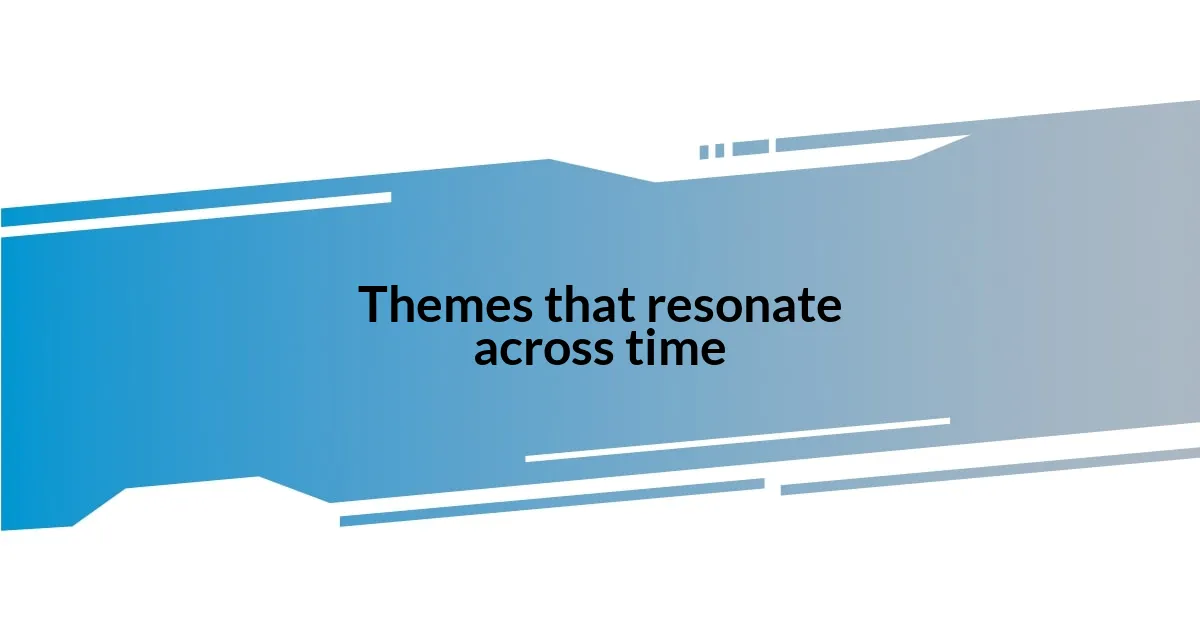
Themes that resonate across time
Exploring the themes of love and loss in classic literature often brings me to Wuthering Heights. I vividly remember the whirlwind of emotions that washed over me as I read about Heathcliff’s torment and unrequited love. Isn’t it fascinating how such raw feelings can transcend time and resonate with anyone who has faced heartbreak? Those themes remind us that, regardless of the era, love’s complexities and the pain of longing remain relevant.
Equally compelling is the theme of ambition found in Moby-Dick. I recall my mix of admiration and dread as I followed Captain Ahab’s obsessive quest for revenge against the great whale. This narrative prompts me to question: how much are we willing to sacrifice in pursuit of our dreams? Ahab’s tragic downfall serves as a warning about the potential perils of single-minded ambition, encouraging me to strike a balance in my own pursuits.
Additionally, the exploration of moral dilemmas in classics like Crime and Punishment continues to captivate me. I remember grappling with Raskolnikov’s justifications for committing murder and how they sparked debate within myself about ethics in everyday life. Isn’t it intriguing how classic characters often push us to confront our own moral boundaries? These texts not only entertain but challenge me to think deeply about right and wrong in our complicated world.
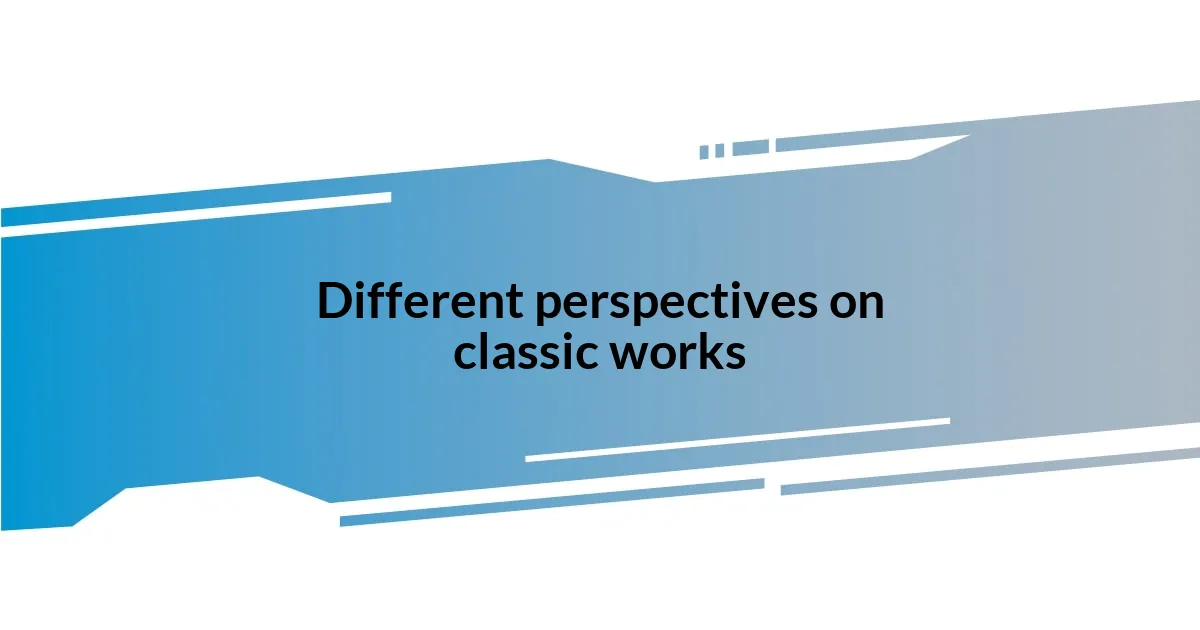
Different perspectives on classic works
Revisiting classic works often reveals the multiplicity of perspectives that different readers can bring. I recall a discussion I had with a friend about Pride and Prejudice. As I shared my view on Elizabeth Bennet’s spirited independence, my friend offered a contrasting take, emphasizing the societal constraints she faced. It struck me then how two individuals could analyze the same text and come away with entirely different interpretations, showcasing the richness embedded in classic literature.
There’s also a unique joy in witnessing how modern contexts can reshape our understanding of these texts. When I revisited The Great Gatsby, I found myself grappling more with the themes of inequality and privilege within today’s social climate. My previous focus on romance shifted, prompting me to ask: how does Gatsby’s dream reflect current societal aspirations? This perspective shift not only deepened my appreciation but also underscored the timeless relevance of these works as they resonate with current events.
Moreover, engaging with classics alongside others can illuminate viewpoints I might not have considered. I remember attending a book club discussing To Kill a Mockingbird, where participants shared their personal experiences with injustice. Listening to their stories added layers of meaning to Harper Lee’s exploration of morality and empathy. Isn’t it fascinating how collective discussions can breathe new life into well-trodden texts, highlighting their continued ability to spark important conversations?
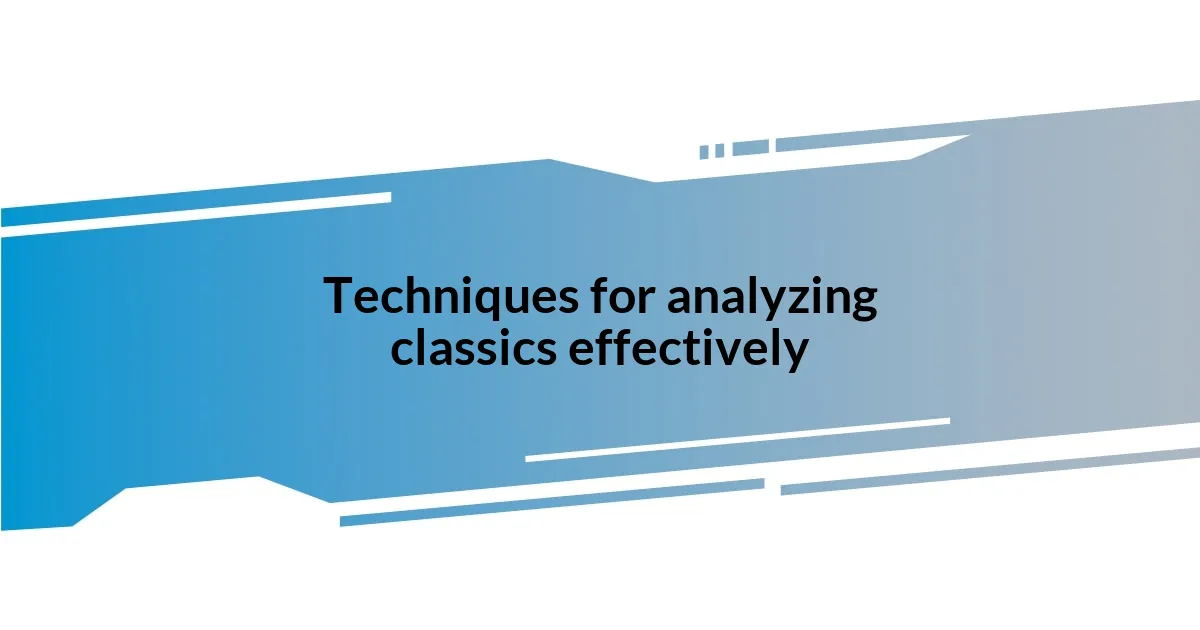
Techniques for analyzing classics effectively
To analyze classics effectively, I find that immersing myself in historical context adds depth to my understanding. For instance, when I approached The Scarlet Letter, I researched the Puritan society in which Hester Prynne lived. This exploration helped me grasp the weight of her punishment and the societal norms that shaped her actions, revealing layers I had previously overlooked. Have you ever considered how the background of a story can alter your perception of its characters and themes?
Another technique that truly enhances my analysis is engaging with secondary sources, such as critical essays or literary reviews. When I revisited 1984, I sought out different interpretations that explored Orwell’s critique of totalitarianism. This external insight allowed me to view the text through multiple lenses, sparking fresh conversations in my mind about freedom and control. Isn’t it intriguing how the voices of scholars can breathe new life into our readings?
Lastly, I’ve discovered that annotating while reading can transform my experience entirely. As I jotted down my thoughts while rereading Jane Eyre, I began to connect the dots between Charlotte Brontë’s narrative choices and the themes of resilience and morality. This active engagement not only kept me invested in the story but also led me to question my own definitions of strength and independence. Have you tried annotating? I believe it can turn passive reading into an enriching dialogue with the text itself.
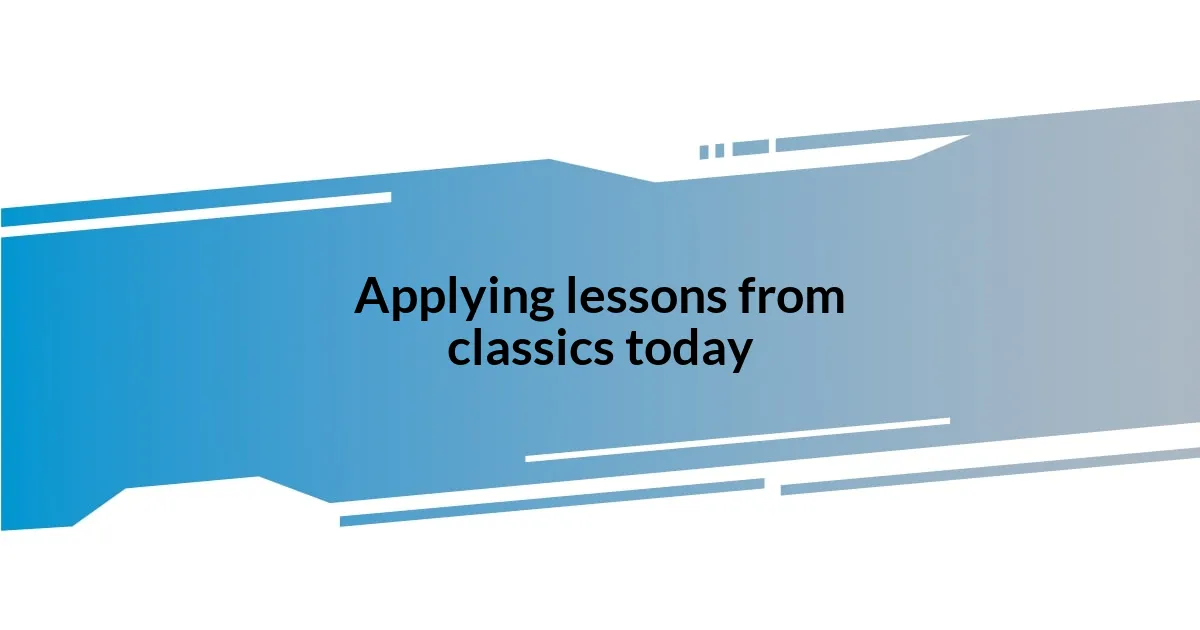
Applying lessons from classics today
Applying the lessons from classic literature to our modern lives can be enlightening. I remember a moment while rereading The Catcher in the Rye. Holden Caulfield’s struggles resonated with my own experiences of feeling a bit lost. It prompted me to reflect: how often do we overlook mental health discussions in our own circles? Recognizing these themes in classics can encourage us to open up about our struggles, fostering deeper connections with others.
Another realization came from revisiting Brave New World. Although dystopian, it echoes contemporary issues around technology and consumerism. I found it striking how Huxley’s concerns about distraction and instant gratification mirror our current obsession with screen time. This connection made me consider my own habits. Are we truly aware of how technology shapes our identities and interactions? I’ve started limiting my own screen time, aiming to reclaim moments of mindfulness that are so easily lost in the digital noise.
Lastly, engaging with these texts gives us timeless moral frameworks. During a recent read of Les Misérables, Jean Valjean’s journey from sin to redemption inspired me to think about forgiveness in my own life. I asked myself: how often do we give others a chance for growth? Taking that lesson forward, I’ve tried to be more forgiving in my relationships, understanding that everyone has a story worth hearing. Literature, it seems, serves as a mirror reflecting our own choices and the potential for change.